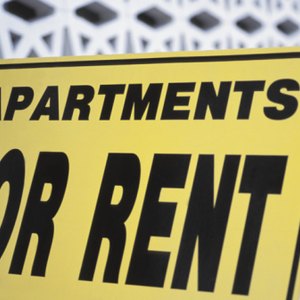
The Washington State Landlord-Tenant Act protects renters and property owners involved in a property rental arrangement. Landlords in the state of Washington must follow the legal process when removing tenants from a property when they fail to pay rent or violate the lease agreement. Property owners may not use self-help measures such as changing locks or discontinuing utility services to force tenants to leave the property.
Failure to Pay Rent
Tenants have an obligation to pay rent when in a landlord and tenant relationship, according to the Washington State Landlord-Tenant Act. The state allows landlords to seek remedy when tenants fail to comply with the lease agreement and the law by failing to pay rent. Before the legal eviction process can begin, the landlord must serve the tenant with a three-day notice to pay the rent or vacate the property. Tenants can avoid an eviction by paying the amount owed to the landlord for rent. The notice must be in writing and served to the tenant in compliance with the landlord and tenant act in the state.
Illegal Activities
Landlords must serve a three-day notice to vacate on tenants engaged in illegal activities on the rental property. In addition to illegal activities, landlords can serve a three-day notice to tenants causing a nuisance on the property.
Lease Agreement Violations
Landlords in Washington state must provide tenants an opportunity to correct lease violations before beginning the eviction process. When a tenant fails to comply with the lease agreement, landlords must serve a 10-day notice to allow the tenant the chance to correct the problem. For example, if a tenant has a pet in violation of the lease agreement, the landlord must give him 10 days to remove the pet from the property before taking the next step in the eviction process.
Notice Expiration
When tenants fail to comply with the written notice to pay rent or correct a violation of the lease agreement, landlords may begin the eviction process in the state of Washington. Landlords must file an eviction with the court to remove a tenant from a rental property. Landlords may also file an unlawful detainer action with the court when tenants fail to vacate the property at the end of the lease term.
References
- Joint Center for Housing Studies at Harvard University. "America's Rental Housing 2020," Page 9. Accessed March 20, 2020.
- Nolo. "State Laws on Landlord's Access to Rental Property." Accessed March 20, 2020.
- Nolo. "How Evictions Work: Rules for Landlords and Property Managers." Accessed March 20, 2020.
- U.S. Department of Housing and Urban Development. "Housing Discrimination Under the Fair Housing Act." Accessed March 20, 2020.
Writer Bio
Luanne Kelchner works out of Daytona Beach, Florida and has been freelance writing full time since 2008. Her ghostwriting work has covered a variety of topics but mainly focuses on health and home improvement articles. Kelchner has a degree from Southern New Hampshire University in English language and literature.

